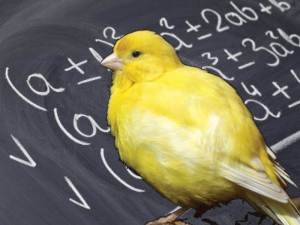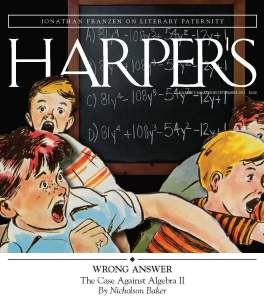 A recent article in Inside Higher Ed brought to mind a couple of tense interactions I’ve had with the chairs of math departments around the CSU. This is unusual because, in the words of one member, “the math chairs are the most liberal minded broad based group of mathematicians you will be likely to deal with.” This is true. Consistently they’ve gone out of the way to deal collegially with everyone, even those they feel badgered by. And they’ve followed through with genuine innovation.
A recent article in Inside Higher Ed brought to mind a couple of tense interactions I’ve had with the chairs of math departments around the CSU. This is unusual because, in the words of one member, “the math chairs are the most liberal minded broad based group of mathematicians you will be likely to deal with.” This is true. Consistently they’ve gone out of the way to deal collegially with everyone, even those they feel badgered by. And they’ve followed through with genuine innovation.
But lately they’ve had two compelling reasons to talk to me, a pair of documents that question which topics from intermediate algebra we expect every college graduate to know. We’ve traditionally set the bar high, to include topics like logarithmic equations, factoring quadratics, and what kind of formulas turn into hyperbolas when you graph them.
The problem is that setting the bar at this height has kept many students from finishing college who otherwise would. So people all over the country, including those in the CSU, want to revisit the standing standards.
I like math, even though I’m not a mathematician. But liking it is one thing, and using it is another. In a recent and very funny essay in Harper’s Magazine called “Wrong Answer,” Nicholson Baker ridicules the math hawks like Education Secretary Arne Duncan, who insist that everyone needs all of those skills or shouldn’t get out of high school, let alone college. My favorite part of the essay, as it reviews a recently released textbook:
Then you learn something more about points of discontinuity: they can be either removable or non-removable. For instance: “The graph of y=[(x + 3)(x + 2)]/(x+2) has a removable discontinuity at x = −2.” Simple as pie on a parsonage table.
To reinforce your learning—to make it really bake itself in your mind, so that you’ll be able to call upon it in times of quantitative uncertainty in the years to come—there are some exercises to do.
 The lacerating sarcasm between those dashes is to me an amazing piece of writing. There’s no doubt in Baker’s mind, nor presumably in his readers’, that those moments of quantitative uncertainty won’t come. We will never draw on this skill.
The lacerating sarcasm between those dashes is to me an amazing piece of writing. There’s no doubt in Baker’s mind, nor presumably in his readers’, that those moments of quantitative uncertainty won’t come. We will never draw on this skill.
When I first read this essay I thought he was right. As it happens, I do understand why there would be a discontinuity at -2: it’s because you can’t divide anything by zero. But I wouldn’t dream of drawing on such skills “in times of quantitative uncertainty.”
So then why is it the litmus test for holding a college degree?
Or conversely, how ripped off would I feel if I couldn’t follow this excerpt? Would I consider my alma mater a diploma mill? Would you?
But the more I thought about his essay, the less distracted I was by the good writing. The fact is, if I couldn’t read that equation, I would feel short-changed.
There’s a problem here, and it bleeds into disciplines other than math. We may have used the manipulation of abstract symbols so mocked by Baker as a proxy for what we really mean by quantitative reasoning. It’s a little like making people memorize state capitals to stand for a sense of history. Or conduct “cookbook” chemistry experiments with foregone conclusions, to promote scientific curiosity. We know these aren’t the same things; they’re just easier to deliver and test.
But they also trivialize what we’re really after, and so leave us vulnerable to skeptics.
The policy documents I wrote for the CSU authorize alternate approaches to math curriculum, ones that would be likelier to please Nicholson Baker than Arne Duncan. They lower the bar, for a subset of students on a pilot basis, and then monitor their performance in subsequent coursework.
Educators quake at this. There are a handful of professions where your assertion of quality is essentially all that you sell. Jewelers for one, vintners for another, because – as with higher education – lay buyers lack the expertise to assess the worth of their wares. So outsiders pay you for informed, honest judgment. Fudge the facts and you degrade the profession, and eventually blow the gig.
 So when the chairs of the CSU math departments see compromises like this, they are put in an impossible situation. I think consciously or not, they feel forced to misrepresent the value of the degree. Their response is deep and visceral. And it should be.
So when the chairs of the CSU math departments see compromises like this, they are put in an impossible situation. I think consciously or not, they feel forced to misrepresent the value of the degree. Their response is deep and visceral. And it should be.
But visceral doesn’t mean right. (Consider our grandparents’ take on gay marriage.) Their long-held assumption about what a degree means isn’t enough to make it so, even though it once was.
Instead, we need to get closer to defining, developing, and assessing the real learning that we care about. If we want our graduates to be confident modeling a world that includes unknown quantities, then we should make it clearer that intermediate algebra does that. And if we can’t make it clearer, then intermediate algebra will face continued assault.
The rationale of “learn it because I’m an expert who tells you to” just isn’t working anymore, and shouldn’t. The public is right to expect better answers. Coming up with those is the urgent work of us all, and not just the math chairs.
Because in this coal mine, they’re the canaries.

This post points to a problem that goes deeper than the question of how much quantitative literacy ought to be expected of all college graduates.
The higher education community has no principled way to shape decisions about performance levels. On what basis would one determine whether the mathematical prowess you reference ought to be exhibited by all college graduates?
Of course math department chairs, who are as you say the most civil academics we could hope for, would expect a very high standard.
If music professors enjoyed the status of mathematics professors in the pecking order, anyone who could not explain the function and form of a minor seventh flatted nine chord would have an undergraduate degree. They may not have to actually use such a chord in a performance, but given the power music professors might well demand that engineers must demonstrate competence at the piano.
How do we in higher education make these decisions? What are our assumptions about the relationship between life inside and outside the classroom? Or is this question even on the table in the CSU?
Thank you, Terry. I would love a better sense of appropriate authority over this. If GE is the core of learning we expect of all educated adults, then subdividing control of its requirements among the disciplines seems wrong, and too influenced by how we shape requirements in majors. But then what? Disqualify people for excessive expertise?
Not at all. Apply expertise in a principled way tied to empirical assessment.
Trust and track, then judge based on evidence.
I wonder if WICHE came up with the trust and track strategy from the Cold War? Mr. Gorbachev tear down this wall! For my money much of the angst of revisioning GE stems from locating discussions of the curriculum in a political setting where solutions are the product of isolated discussions among very bright people passionate about a subject matter who don’t trust others passionate about another subject matter to share the curriculum and therefore do not want to assess much of anything empirically. I would rather see the CUS community begin studies of its its curriculum in light of outcomes which have been spelled out across rather than within departments–so Ken would not be holding discussions of QL just with math department chairs. In the current context we are all canaries together.
Ken, I’ve been thinking about the phrase “excessive expertise” and want to suggest a bit of a revision to the phrase “differentiated expertise.” Instead of disqualifying excessive expertise, how about inviting differentiated expertise? What if the appropriate level of competence for a GE outcome like quantitative literacy were to be determined by an interdisciplinary group? Could such an arrangement mitigate against what some believe are “excessive requirements?” Could this approach lead to the possibility of prerequisites more closely targeted to real curricular needs down the road?
I had the opportunity to observe the WICHE Passport discussions unfold in bunkers built from disciplinary bricks. For the life of me I could not understand why the oral communication discussions took place completely separate from the written communication discussions. How can we expect learning outcomes to make sense across disciplines when they are rarely built across disciplines? How can we expect student learning to take on the integration we know it can take on without collaborating on the curriculum? Differentiated expertise could be one of the starting principles for developing a strategy that might bring greater coherence and pragmatic effect to GE.
Bring together some nursing department chairs to talk about requisite competence in QL. Ask the math department chairs to talk about requisite competence in written communication. Just try it–just one time–seriously, in an organized and resourced way.
I really like this, Terry — differentiated expertise, cross-disciplinary groups developing a shared sense of the contribution each makes to the whole. I’m going to pass this around, and see how far we get.
Perhaps there is another way to frame the conversation around what mathematical capabilities we should expect all undergraduate students to develop. The 2001 National Research Council report Adding It Up described several capability strands: the conceptual understanding and procedural fluency that we typically teach and assess explicitly…and additional capabilities such as adaptive reasoning (“capacity for logical thought, reflection, explanation, and justification”) and productive disposition (” habitual inclination to see mathematics as sensible, useful, and worthwhile, coupled with a belief in diligence and one’s own efficacy”).
Can we reframe some of our conversations around ‘trading off’ between capabilities instead of ‘dumbing down’? The emerging course designs for developmental math, such as the California Acceleration Project and the Statway/Quantway pathways, place more emphasis on these metacognitive and attitudinal strands, while intentionally trading off some of the conceptual and procedural outcomes. If students achieve a bit less in acquiring procedures for doing math but more inclination to regard mathematical models and quantitative reasoning as valuable tools and more capability to apply the procedures they do know to real-world problems…might that not be worthwhile progress?
Of course, we would need reliable evidence that these deeper outcomes were in fact being achieved. Fortunately, there is some promising work in this area appearing from the Balanced Assessment team and other researchers working to support the Common Core State Standards for Math. Some of our community colleges in the Los Angeles region are planning a cooperative innovation project in 2014 to explore how this might work in practice for our courses.
Tom Carey
tcarey@mail.sdsu.edu
http://crmse.sdsu.edu/tcarey.html
Thanks for this, Tom — it’s very helpful. I’ve downloaded the publication. I especially like your observation that it’s more accurate to talk in terms of trade-offs than lowering the bar. Point taken.
Much of what you describe from the report as QL outcomes, Tom, could be seen as cross-curricular outcomes, particularly adaptive reasoning and productive dispositions. Elaborating on these outcomes in interdisciplinary groups would make clear the need to support QL development not just in one designated course but wherever its application is called for.
Thanks for raising this, Terry. I’d have to say “Yes and No” :). Yes, it is certainly our intent that the meta-cognitive capabilities be generalized across knowledge and practice domains. But the research evidence suggests that this is much more complex than we might at first think – I can remember as a computer science prof in the late 70’s asserting that studying computer programming was bound to help students’ reasoning abilities across the board, only to be chagrined when research in the 80’s demonstrated convincingly that little of this hypothesized transfer was actually taking place.
The same dilemma is encountered by tests of general reasoning ability like part of the Collegiate Learning Assessment: students who have developed sophisticated adaptive reasoning in the physical sciences don’t always make the transfer to other areas like public policy or community relations (where the issues are complex in different ways and the rules of evidence are different).
That challenge doesn’t weaken your point about not leaving decisions about undergraduate degree level expectations in the hands of discipline experts. Ken might want to ask his math chairs when they last needed to solve a quadratic equation – or understand the conceptual basis for such a procedure – in their roles as community member or global citizens (i.e., outside of their work as professional mathematicians).
Tom, you remind me of all of the research on situated learning and communities of practice. Transfer of learning is at odds with this perspective. Like you, I am skeptical that it happens routinely, especially not in a system that has been built as a collection of silos.
I know that the notion of productive dispositions arose and is situated in mathematics, but I do think students will need guided and planned experiences across the curriculum if they are to enact such dispositions routinely. Isn’t the intent to create students who are appropriately disposed to use mathematical reasoning in non-math contexts?
And I think other subjects need to attend to these dispositions in their own ways, notably public speaking and writing where unproductive dispositions can derail development.
This kind of cross-field communication we are having could yield lots of benefits for curriculum and instruction.
I really appreciate these comments. By coincidence today was a periodic meeting of the CSU’s statewide committee on general education, which wrestles with many of these same questions — most vividly today, how to convene groups of subject matter experts without reproducing silos. If GE ever hopes to be more integrative than it’s been, then we need to figure that out.
The issue I have with this sort of thing is that the exact same argument can be made about nearly anything, but is generally confined to math and maybe physical science. Here is the reprehensible quote from Nelson Baker, but revised to ridicule philosophy instead of mathematics:
Then you learn something more about the nature of time, which can be regarded as internal to the mind, or as an external phenomenon. For instance: “Time is not a thing, thus nothing which is, and yet it remains constant in its passing away without being something temporal like the beings in time” – M. Heidegger. Simple as pie on a parsonage table.
To reinforce your learning—to make it really bake itself in your mind, so that you’ll be able to call upon it in times of philosophical uncertainty in the years to come—there are some papers to write.
Not that I think we should require proficiency in algebra (I do actually, but it’s a battle lost long ago), but math is an intellectual skill that everyone should have some command of. I hear many faculty and many more students tell me that they can’t do math. I never hear technical people tell me that they can’t read. There is an unwarranted disparity in our expectations.
The analogy is really helpful, Roger, and why I think of math faculty as the canaries here. The rest of the liberal arts, humanities, etc. are next. (Or rather, already gasping for air: http://www.nytimes.com/2013/10/31/education/as-interest-fades-in-the-humanities-colleges-worry.html.)
As you say, “math is an intellectual skill that everyone should have some command of,” and in the same way, I think anyone with a degree should be able to follow your Heidegger quote about time. It’s reasonable to expect our graduates to have the capacity (if not the inclination) to step back from lived experience, and to wonder which parts of it are independent of perception.
The challenge, as Terry points out in his first comment, is to say WHY we want that for our students. What are we saying should be the relationship between life inside and outside of the classroom? We’ve done a poor job so far of explaining that.
Glad you stopped by.
Hey Ken!
I think the canaries may already be dead in another coal mind. Remember when you and I had music, art, and PE in school? How many kids still get those subjects? They went away when funding public education became optional in this society. And, what did we lose? The pain of Middle School orchestra concerts — and, education in a discipline that improves language, reasoning, spacial intelligence, and creativity. No more PE? Fine — I hated it anyway! So what if we now face an epidemic of childhood obesity?
The story you tell about math is not new — it’s just that we in Higher Ed are beginning to cope with the issues that our colleagues in Public Ed have been dealing with for a long time.
Thanks for stopping by, Alice, and for raising such good (and sobering) points. The precursors here are not promising.